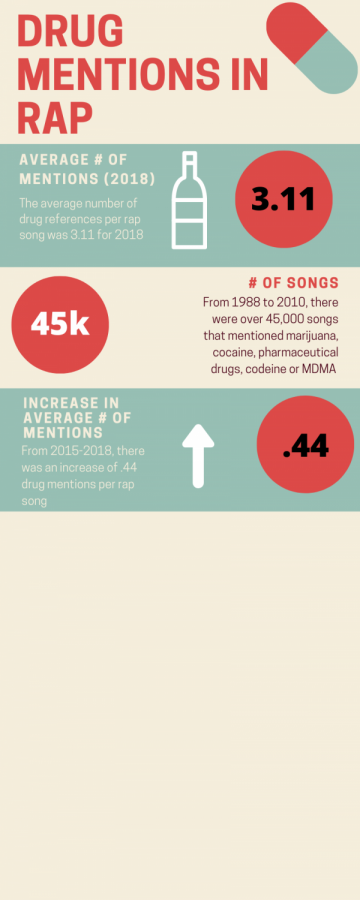A Culture that Kills: Rappers Should Be Mindful of the Drugs They Promote
February 7, 2020
With the recent death of rapper Juice Wrld, the lethal impacts of drug culture and usage have become a disturbing reality for many. Juice Wrld died due to an accidental overdose on codeine and oxycodone, prescription pain medication often used to get high, in an effort to hide them from the authorities who were planning on searching his private jet. His possession of such high quantities of these harmful drugs does not come as a surprise, as it was well known by many of his fans that he regularly experimented with drugs.
“A lot of his lyrics stemmed from his drug usage,” sophomore David Popham said. “I thought it was negative. He had a lot of things going on; knowing he was hurting his own body was upsetting.”
Juice Wrld isn’t the only rapper to die of a drug overdose in recent times; drugs were also responsible for the untimely death of Lil Peep in November 2017. But drug usage and culture isn’t a new concept in rap. Drugs have played a significant role in rap since its inception.
“Since the 80s, drugs have had a heavy impact on rap groups,” Popham said. “N.W.A and others had a lot of drugs cultured around what they did, and they made a lot of money and songs based on drug culture,” Popham said.
To many followers of hip-hop, the increasing focus on and glamorization of drugs represents a change for the worse in the industry.
“I think it has lost its initial meaning. It used to be about socio-economic problems and disadvantages people of lower classes experienced,” senior David Westrate said. “[Now,] it heavily emphasizes drug use and glorifies it to the point where the music doesn’t even talk about its drawbacks.”
However, the rap industry isn’t completely characterized by drug culture. Many hip-hop fans see the industry in a different light.
“Rap right now is whatever you want it to be,” senior Jacob Epstein said. “It represents a lot of hope; a lot of kids are blowing up out of nowhere at a really young age and they’re making a lot of money.”
Many rappers have begun to push back on drug usage, recognizing the negative impacts of glamorizing drugs. Another prominent rapper in the industry, Future, has publicly regretted his promotion of lean, a drink containing opiates, in his music. In an interview with Rolling Stone, he expressed his shock to hear how much he influenced Juice Wrld and many of his fans to experiment with drugs. Future never apologized for rapping about drugs and his own experience with them, but he did apologize and feel great responsibility for influencing others to “act out of character,” as he said in the magazine.
Despite some rappers speaking out against drugs, many fans still feel as though popular songs and the music industry itself promotes drugs in a detrimental way.
“It links these harmful drugs with having fun and partying and being rich, encouraging people to do it,” Westrate said.
While many rap artists glamorize and promote drugs that oftentimes influence listeners to experiment with them, this does not mean that all of the rap industry is focused solely on drugs. The industry represents hope for many up-and-coming artists to make a name for themselves, and rap frequently covers inspirational and controversial subjects. It is completely inaccurate to characterize the industry as full of hooligan drug addicts. Hip-hop is far more dynamic and has more reach than many who label it as completely corrosive would think. But, with the death of Juice Wrld and other talented young artists, it’s become apparent that the rap industry and prominent rap artists need to stop glamorizing drug culture and take a hard stance against drugs.


